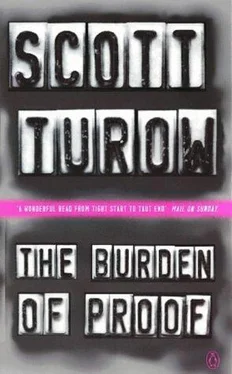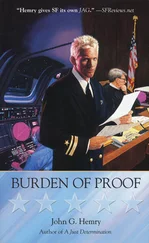Scott Turow - The Burden of Proof
Здесь есть возможность читать онлайн «Scott Turow - The Burden of Proof» весь текст электронной книги совершенно бесплатно (целиком полную версию без сокращений). В некоторых случаях можно слушать аудио, скачать через торрент в формате fb2 и присутствует краткое содержание. Жанр: Детектив, на английском языке. Описание произведения, (предисловие) а так же отзывы посетителей доступны на портале библиотеки ЛибКат.
- Название:The Burden of Proof
- Автор:
- Жанр:
- Год:неизвестен
- ISBN:нет данных
- Рейтинг книги:3 / 5. Голосов: 1
-
Избранное:Добавить в избранное
- Отзывы:
-
Ваша оценка:
- 60
- 1
- 2
- 3
- 4
- 5
The Burden of Proof: краткое содержание, описание и аннотация
Предлагаем к чтению аннотацию, описание, краткое содержание или предисловие (зависит от того, что написал сам автор книги «The Burden of Proof»). Если вы не нашли необходимую информацию о книге — напишите в комментариях, мы постараемся отыскать её.
The Burden of Proof — читать онлайн бесплатно полную книгу (весь текст) целиком
Ниже представлен текст книги, разбитый по страницам. Система сохранения места последней прочитанной страницы, позволяет с удобством читать онлайн бесплатно книгу «The Burden of Proof», без необходимости каждый раз заново искать на чём Вы остановились. Поставьте закладку, и сможете в любой момент перейти на страницу, на которой закончили чтение.
Интервал:
Закладка:
Eventually, three years ago, Guy had played a losing game of Russian roulette, one round in the chambers-he had, apparently, let the goblins take their shot.
In the midst of his unnerving, half-drank confession, Pieace had laughed, because some famous depth psychologist, probably Freud, had commented that human beings cannot grasp the reality of their own deaths2 That was not true of Guy; and probably not of Clara, or most others who make a deliberate departure. The cup is always half empty or half full. For most of us-certainly for Sternrathe concern was over how much remained. Since the time of his fortieth birthday, in his inevitable greedy way, he had remained irritated by the feeling that the serving had been slight to start with. Here, at home, under his covers, alone with the afternoon sounds of the neighborhood and the air conditioning recirculating the still air of the household, he recognized how frightened Clara's death had left him. We stand in line with certain recognizable figures. Her turn.
Now yours.
But for Clara, a bit lille Guy, the moment must never have been far away. Nate, in fact, said she had told him as much. To Clara it was always a brief ride to a known destination. She meant to be of service along the way. But a sense of futility that went beyond any psychological l name-depression or anomie-no doubt often overcame her.
What was the point in waiting, given the aeons, the eternity in which she would never take part? And in this frame of mind she had faced her final choices. Dixon's magnificent, grandiose act in the end must have only complicated her overwrought state. There was not a bearable alternative on the horizon. Could she actually stand by and watch as Dixon undertook this gruesome act of selfsacrifice? Could she reveal her problems, and the past, to her husband, devastating him and, in all likelihood-given the odd explosive chain effect of anger and grief--Silvia, too? That would be a poor reward for Dixon, who, in the circumstance, might even lose the will and strength to see his promise through. Could she instead bear the rest of it and also watch her children march off to the penitentiary?
It was not suicide, thought Stern. Not in her eyes. It was euthanasia in the face of mortal heartbreak.
Could he have saved her? Was it the cheapest lie, the glossiest balm for his soul to think that if the same two persons had married today, in a franker era, this would not have taken place? They had assigned one another roles at a time when their own ambitions for each other allowed for more unexplored geography. Now there were counselors and meddlers and self-help aids to force couples to walk within each other's fence.
He had respected boundaries that, with just a bit more strength or attention or nerve,. he might have been able to surmount. His every effort, though, would have been against her ill.
Thirty-odd years ago, Clara Mittler had drafted a composition, called it Clara Stern, and remained intent on playing it to the end. It was a woodwind part of austere and unwavering beauty, and he was the uncritical audience, one set of hands clapping when he took the time to occupy his seat. The quiet precision of this performance hid from all -but most significantly herself-a terrible banging turmoil. Somewhere, well beyond her power to bring it forth, there must have been a thunderous rage. She knew it only as disorganized sound. The noise, she had told Nate, the crashing dissonance of anxiety and unending disappointment, was always with her. Ultimately the noise had come from all directions, at unendurable volume, and Clara bowed to the aesthete's inevitable grief that Beauty would not be her.
He knew for some reason just now what he had not beforemhow it was done.
He had never understood why she had chosen the car. But today that was clear. She had triggered the ignition and then slipped a cassette into the player. The police, of course, had not even looked. It would have been Mozart, certainly, but Stern felt a stitch of a keen frustrated grief that he would never know which selection.
The Requiem? The Jupiter? But the remainder he could imagine. The volume had been turned up considerably-the woodwinds lowed with lost sounds of the soul and the plangent violins engulfed the small space, so that even a fine ear could not detect the engine's rumble, and she lay back, eyes already closed, no doubt, while the magnificent music rose in great waves toward that perfect momentat the end of every piece when there was silence.
WHEN Helen called, Stern was dreaming: Dixon had accosted him on a street comer. He was smoking one of Stern's cigars and in his usual joking manner was pointing out that he had gone bald. He circled his hand over his crown and with considerable satisfaction turned about so that Stern could see the large spot where the straight black hair had actually fallen away. As Helen spoke, the dream and its difficult feelings still swam within him and for just the barest instant he was convinced his dreaming had gone on.
"What?" He was lost. Was she crying?
"I need you." She seemed short of breath. When he had answered-as in the office, 'Stern here'-she had said repeatedly she was sorry to be calling. Sorry. Sorry. "I need you here. Please."
"Yes, yes. I shall be there momentarily."
In the bathroom, he felt unbalanced by the light. He splashed water on his face and gave up the thought of shaving. The line of a sheet was impressed on his cheek.
Had she even mentioned the problem? One of her children, he imagined.
The boy in college. He crept down to the garage.
When he started the Cadillac, the digital clock flashed on.
It was almost three; early Friday morning. He had been asleep since a little after nine, having gotten only an hour or two on Wednesday night.
Marta had kept him awake, demanding that he share in advance every thought and nuance that would go into the closing argument in U.S.v.
Cavarelli. Stern had delivered this argument at ten yesterday morning, then waited with poor Remo most of the day for the jury, which returned near five o'clock. Not guilty. With the verdict, Judge Winchell had fixed Remo with a sour look, but her sole comment had been to Moses Appleton: 'Better luck next time." Marta, who had assisted her father throughout, even cross-hat perfect momentat the end of every piece when there was silence.
WHEN Helen called, Stern was dreaming: Dixon had accosted him on a street comer. He was smoking one of Stern's cigars and in his usual joking manner was pointing out that he had gone bald. He circled his hand over his crown and with considerable satisfaction turned about so that Stern could see the large spot where the straight black hair had actually fallen away. As Helen spoke, the dream and its difficult feelings still swam within him and for just the barest instant he was convinced his dreaming had gone on.
"What?" He was lost. Was she crying?
"I need you." She seemed short of breath. When he had answered-as in the office, 'Stern here'-she had said repeatedly she was sorry to be calling. Sorry. Sorry. "I need you here. Please."
"Yes, yes. I shall be there momentarily."
In the bathroom, he felt unbalanced by the light. He splashed water on his face and gave up the thought of shaving. The line of a sheet was impressed on his cheek.
Had she even mentioned the problem? One of her children, he imagined.
The boy in college. He crept down to the garage.
When he started the Cadillac, the digital clock flashed on.
It was almost three; early Friday morning. He had been asleep since a little after nine, having gotten only an hour or two on Wednesday night.
Marta had kept him awake, demanding that he share in advance every thought and nuance that would go into the closing argument in U.S.v.
Cavarelli. Stern had delivered this argument at ten yesterday morning, then waited with poor Remo most of the day for the jury, which returned near five o'clock. Not guilty. With the verdict, Judge Winchell had fixed Remo with a sour look, but her sole comment had been to Moses Appleton: 'Better luck next time." Marta, who had assisted her father throughout, even cross-examined one of the surveillance agents, was eager to celebrate. Gracious to the core, Moses had insisted on buying both of them a drink..After a single soda water, Stern had left Marta and Appleton for the sleep of the old and weary. Why were triumph and exultation always so fleeting? He drove through the night streets now, toward Helen's, waking gradually and increasingly alarmed.
Читать дальшеИнтервал:
Закладка:
Похожие книги на «The Burden of Proof»
Представляем Вашему вниманию похожие книги на «The Burden of Proof» списком для выбора. Мы отобрали схожую по названию и смыслу литературу в надежде предоставить читателям больше вариантов отыскать новые, интересные, ещё непрочитанные произведения.
Обсуждение, отзывы о книге «The Burden of Proof» и просто собственные мнения читателей. Оставьте ваши комментарии, напишите, что Вы думаете о произведении, его смысле или главных героях. Укажите что конкретно понравилось, а что нет, и почему Вы так считаете.












